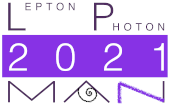Speaker
Description
The Dark matter Experiment using Argon Pulseshape discrimination (DEAP) utilizes a single-phase liquid argon (LAr) detector aiming to acquire the scintillation light produced by nuclear recoils expected to be induced by Weakly Interacting Massive Particle (WIMP) candidate of dark matter. The DEAP-3600 detector consists of about 3.3 tonnes of LAr in a spherical acrylic vessel viewed by 255 photomultiplier tubes. It is located in the SNOLAB underground facility at a depth of approximately 2 km to reduce the cosmic-ray muon induced neutron backgrounds and has been taking data stably since November 2016. DEAP-3600 demonstrated excellent performance for pulseshape discrimination between nuclear recoils and electronic recoils induced by $\beta$ and $\gamma$-rays originating from internal and external radioactivity in the detector material. It has achieved the most sensitive limit for the spin-independent WIMP-nucleon cross-section above 30 GeV/c$^{2}$ WIMP mass among argon-based experiments and leading sensitivity among all experiments for various dark matter scenarios. The talk presents the latest DEAP-3600 results demonstrating the background rejection, sensitivity to dark matter and the status of ongoing analyses.




